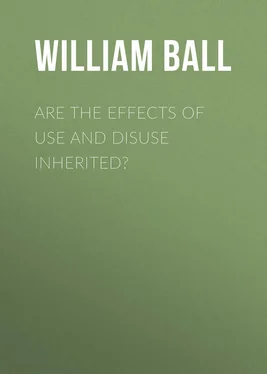William Ball - Are the Effects of Use and Disuse Inherited?
Здесь есть возможность читать онлайн «William Ball - Are the Effects of Use and Disuse Inherited?» — ознакомительный отрывок электронной книги совершенно бесплатно, а после прочтения отрывка купить полную версию. В некоторых случаях можно слушать аудио, скачать через торрент в формате fb2 и присутствует краткое содержание. Жанр: foreign_antique, foreign_prose, на английском языке. Описание произведения, (предисловие) а так же отзывы посетителей доступны на портале библиотеки ЛибКат.
- Название:Are the Effects of Use and Disuse Inherited?
- Автор:
- Жанр:
- Год:неизвестен
- ISBN:нет данных
- Рейтинг книги:5 / 5. Голосов: 1
-
Избранное:Добавить в избранное
- Отзывы:
-
Ваша оценка:
- 100
- 1
- 2
- 3
- 4
- 5
Are the Effects of Use and Disuse Inherited?: краткое содержание, описание и аннотация
Предлагаем к чтению аннотацию, описание, краткое содержание или предисловие (зависит от того, что написал сам автор книги «Are the Effects of Use and Disuse Inherited?»). Если вы не нашли необходимую информацию о книге — напишите в комментариях, мы постараемся отыскать её.
Are the Effects of Use and Disuse Inherited? — читать онлайн ознакомительный отрывок
Ниже представлен текст книги, разбитый по страницам. Система сохранения места последней прочитанной страницы, позволяет с удобством читать онлайн бесплатно книгу «Are the Effects of Use and Disuse Inherited?», без необходимости каждый раз заново искать на чём Вы остановились. Поставьте закладку, и сможете в любой момент перейти на страницу, на которой закончили чтение.
Интервал:
Закладка:
The lateness and irregularity of the wisdom teeth are sometimes supposed to indicate their gradual disappearance through want of room in a diminishing jaw. But a note on Tasmanian skulls in the Catalogue of the College of Surgeons (p. 199) shows that this lateness and irregularity have been common among Tasmanians as well as among civilized races, so that the change can hardly be attributed to the effects of disuse under civilization.
BLIND CAVE-CRABS
The cave-crabs which have lost their disused eyes but not the disused eye-stalks appear to illustrate the effects of natural selection rather than of disuse. The loss of the exposed, sensitive, and worse-than-useless eye, would be a decided gain, while the disused eye-stalk, being no particular detriment to the crab, would be but slightly affected by natural selection, though open to the cumulative effects of disuse. The disused but better protected eyes of the blind cave-rat are still "of large size" ( Origin of Species , p. 110).
NO CONCOMITANT VARIATION FROM CONCOMITANT DISUSE
It is but fair to add that these instances of the cave-crab's eye-stalk and the closely-packed teeth are put forward by Mr. Spencer with the more immediate object of proving that there is "no concomitant variation in co-operative parts," even when "formed out of the same tissue, like the crab's eye and its peduncle" (pp. 12-14, 23, 33). It escapes his notice, however, that in two out of his three cases it is disuse , or diminished use , which fails to cause concomitant variation or proportionate variation.
THE GIRAFFE, AND NECESSITY FOR CONCOMITANT VARIATION
Having unwittingly shown that lessened use of closely-connected and co-operative parts does not cause concomitant variation in these parts, Mr. Spencer concludes that the concomitant variation requisite for evolution can only be caused by altered degrees of use or disuse. He elaborately argues that the many co-ordinated modifications of parts necessitated by each important alteration in an animal are so complex that they cannot possibly be brought about except by the inherited effect of the use and disuse of the various parts concerned. He holds, for instance, that natural selection is inadequate to effect the numerous concomitant changes necessitated by such developments as that of the long neck of the giraffe. Darwin, however, on the contrary, holds that natural selection alone "would have sufficed for the production of this remarkable quadruped." 8 8 Origin of Species , pp. 198-9; Variation of Animals and Plants under Domestication , vol. ii. p. 328 footnote, also p. 206.
He is surprised at Mr. Spencer's view that natural selection can do so little in modifying the higher animals. Thus one of the chief arguments with which Mr. Spencer supports his theory is so poorly founded as to be rejected by a far greater authority on such subjects. All that is needed is that natural selection should preserve the tallest giraffes through times of famine by their being able to reach otherwise inaccessible stores of foliage. The continual variability of all parts of the higher animals gives scope for innumerable changes, and Nature is not in a hurry. Mr. Spencer, however, says that "the chances against any adequate readjustments fortuitously arising must be infinity to one." But he has also shown that altered degree of use does not cause the needed concomitant variation of co-operative parts. So the chances against a beneficial change in an animal must be, at a liberal estimate, infinity to two. Mr. Spencer, if he has proved anything, has proved that it is practically impossible that the giraffe can have acquired a long neck, or the elk its huge horns, or that any species has ever acquired any important modification.
Mr. Wallace, in his Darwinism , answers Mr. Spencer by a collection of facts showing that "variation is the rule," that the range of variation in wild animals and plants is much greater than was supposed, and that "each part varies to a considerable extent independently" of other parts, so that "the materials constantly ready for natural selection to act upon are abundant in quantity and very varied in kind." While co-operative parts would often be more or less correlated, so that they would tend to vary together, coincident variation is not necessary. The lengthened wing might be gained in one generation, and the strengthened muscle at a subsequent period; the bird in the meanwhile drawing upon its surplus energy, aided (as I would suggest) by the strengthening effect of increased use in the individual. Seeing that artificial selection of complicated variations has modified animals in many points either simultaneously or by slow steps, as with otter-sheep, fancy pigeons, &c. (many of the characters thus obtained being clearly independent of use and disuse), natural selection must be credited with similar powers, and Mr. Wallace concludes that Mr. Spencer's insuperable difficulty is "wholly imaginary."
The extract concerning a somewhat similar "class of difficulties," which Mr. Spencer quotes from his Principles of Biology , is faulty in its reasoning, 9 9 Mr. Spencer weakly argues that an advantageous attribute (such as swiftness, keen sight, courage, sagacity, strength, &c.) cannot be increased by natural selection unless it is "of greater importance, for the time being, than most of the other attributes"; and that natural selection cannot develop any one superiority when animals are equally preserved by "other superiorities." But as natural selection will simultaneously eliminate tendencies to slowness, blindness, deafness, stupidity, &c., it must favour and improve many points simultaneously, although no one of them may be of greater importance than the rest. Of course the more complicated the evolution the slower it will be; but time is plentiful, and the amount of elimination is correspondingly vast.
though legitimate in its conclusion concerning the increasing difficulty of evolution in proportion with the increasing number and complexity of faculties to be evolved. But this increasing difficulty of complex evolution is only overcome by some favourably-varying individuals and species – not by all. And as the difficulty increases we find neglect and decay of the less-needed faculties – as with domesticated animals and civilized men, who lose in one direction while they gain in another. The increasing difficulty of complex evolution by natural selection is no proof whatever of use-inheritance 10 10 I venture to coin this concise term to signify the direct inheritance of the effects of use and disuse in kind . Having a name for a thing is highly convenient; it facilitates clearness and accuracy in reasoning, and in this particular inquiry it may save some confusion of thought from double or incomplete meanings in the shortened phrases which would otherwise have to be employed to indicate this great but nameless factor of evolution.
except to those who confound difficulty with impossibility.
ALLEGED RUINOUS EFFECTS OF NATURAL SELECTION
Mr. Spencer further contends that natural selection, by unduly developing specially advantageous modifications without the necessary but complex secondary modifications, would render the constitution of a variety "unworkable" (p. 23). But this seems hardly feasible, seeing that natural selection must continually favour the most workable constitutions, and will only preserve organisms in proportion as they combine general workableness with the special modification. On the other hand, according to Mr. Spencer himself, use-inheritance must often disturb the balance of the constitution. Thus it tends to make the jaws and teeth unworkable through the overcrowding and decay of the teeth – there being, as his illustrations show, no simultaneous or concomitant or proportional variation in relation to altered degree of use or disuse.
Читать дальшеИнтервал:
Закладка:
Похожие книги на «Are the Effects of Use and Disuse Inherited?»
Представляем Вашему вниманию похожие книги на «Are the Effects of Use and Disuse Inherited?» списком для выбора. Мы отобрали схожую по названию и смыслу литературу в надежде предоставить читателям больше вариантов отыскать новые, интересные, ещё непрочитанные произведения.
Обсуждение, отзывы о книге «Are the Effects of Use and Disuse Inherited?» и просто собственные мнения читателей. Оставьте ваши комментарии, напишите, что Вы думаете о произведении, его смысле или главных героях. Укажите что конкретно понравилось, а что нет, и почему Вы так считаете.












